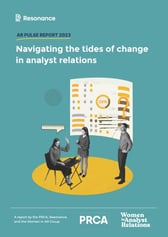2 min read
Character vs. Capability: What’s More Important in Reputation?
Sean Carroll : Nov 30, 2020 12:52:51 PM

The world is changing and – thanks to social media and the internet – we’ve never been more aware of things going on around us. Companies find it difficult to hide and have never been under more pressure to be transparent. But do people really care about what a businesses’ behaviour? To understand, I’m going to explain business capability and character reputation, why they matter, the differences between them, and use some examples along the way.
Capability reputations are focused on what a business can do. What skills, resources and capabilities does it have? It looks at the quality and performance of its operation. An example of a company with a high capability reputation is Amazon, they’re good at what they do and can deliver things on time.
Character reputation is the basis on which we assess how an organisation would behave in relation to its values and intentions. It looks at what a business is really like - a depiction of their internal characteristics. An example of a company with high character reputation would be Insomniac Games. They treat their employees really well. For example, they even offer new parents in the office a custom onesie, art books, toys, as well as a baby briefcase to help them stay organised. Showing how a company with great internal values can shine externally.
Character reputation is much more stable than capability reputation, this is because a business is in full control of their character. A business decides what their values are and how they plan to conduct their business. Character is the foundation which the rest of your reputation sits atop of.
Whereas capability is traditionally fragile because it is controlled, usually, by the ever-shifting public opinion. And because of the internet, it has never been easier for everybody to have an opinion about something.
Just because a business makes a mistake, has a lapse in judgement, or makes a bad decision, this doesn’t mean that they don’t have good character. Obviously, some mistakes are much harder to forgive than others. However, if they ensure that they have consistently good character, then mistakes can be considered out of character.
If a business makes a mistake on top of bad character, then this is a completely different story.
Plant-based milk brand, Oatly, recently came into trouble for doing just this. Their character was always perceived very well – they are good to their employees and they brand themselves as good for the planet. This all came tumbling down when it came to light that they were part of the continued deforestation problem in the Amazon. This resulted in an extremely negative outcry from the public and press, accused of ‘selling their soul’ by many, as they had branded themselves as sustainable and ethical – two things they definitely are not – and it seems likely their sales will be directly affected.
And this shows that having a strong character, and conducting your business in that manner, is important.
However, this doesn’t always ring true. To use Amazon as an example once more, they were recently in the news – again – following an employee walkout in the United States over inadequate pay. This also resulted in negative press and public outcry on social media but did not hugely affect their business. People continue to buy from them because it’s convenient, quick and they’re great at what they do – they have a fantastic capability reputation.
This raises an important question of just how much character matters if a business can still succeed – fully relying on their capability to do the job. Is this able to last? In an increasingly green and conscious society, maybe not, but Amazon seems to be doing alright.
What do you think?



 "The intricacies of the data-driven landscape is written into the DNA of Resonance. We are built for the data economy."
"The intricacies of the data-driven landscape is written into the DNA of Resonance. We are built for the data economy.".jpeg?width=250&height=181&name=AdobeStock_565367297%20(1).jpeg)
 "In Tech PR we have a front row seat to the changing technology landscape. From Generative AI to Quantum, it's our job to insert our clients' voices into the narrative"
"In Tech PR we have a front row seat to the changing technology landscape. From Generative AI to Quantum, it's our job to insert our clients' voices into the narrative"



 "In a world where the only constant is change, how do tech brands stay one step ahead of the market? That's where Resonance comes in"
"In a world where the only constant is change, how do tech brands stay one step ahead of the market? That's where Resonance comes in".png?width=219&height=219&name=Seb%20Moss%20wavelength%20thumbnail%20(1).png)

 "Resonance is a group of technology, business and communications experts"
"Resonance is a group of technology, business and communications experts"

